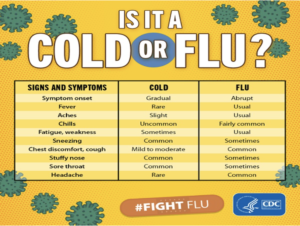What are the cold and the flu?
Influenza (flu) and the common cold are contagious respiratory infections caused by different viruses. Flu is caused by influenza viruses only, whereas the common cold can be caused by a number of different viruses, including rhinoviruses, parainfluenza, and seasonal coronaviruses. Because these two illnesses have similar signs and symptoms, it can be difficult to tell the difference between them based on symptoms alone.
How do you tell the difference between the common cold and the flu?
Because flu and common cold have similar symptoms, they can be difficult to tell apart. In general, flu is worse than cold, and the symptoms are typically more intense. A runny or stuffy nose is more likely to be caused by cold than flu. A cold generally does not result in serious health problems, whereas the flu can cause serious complications such as pneumonia, bacterial infections, or hospitalizations.
Signs and Symptoms of the Cold and Flu
This table can help you find out what symptoms go along with each illness:

Flu Symptoms
Influenza (flu) can cause mild to severe illness, and can lead to death. The most common symptoms of the flu are:
- Fever or feeling chills
- Cough
- Runny or stuffy nose
- Sore throat
- Muscle or body aches
- Fatigue (tiredness)
Treatment of the Flu
There are medications available to help with the flu and its symptoms. Adults over 65 years of age or older, pregnant women, and people with certain medical conditions such as asthma, diabetes, and heart disease are at higher risk of flu complications. It’s very important that flu antiviral drugs are started as soon as possible to avoid flu complications in this patient population.
If influenza antiviral drugs are taken within 1-2 days after flu symptoms begin, these can lessen symptoms and shorten the time you are sick by 1 or 2 days to avoid bigger complications. Vaccination is the best way to prevent the flu.
How can the flu be treated?
Flu antiviral drugs are prescription medicines (pills, liquid, an inhaled powder, or an intravenous solution) that fight against flu viruses in your body. They are different from antibiotics, which fight against bacteria. The four FDA-approved flu antiviral drugs are:
- Oseltamivir phosphate (Tamiflu®),
- Zanamivir (Relenza®)
- Peramivir (Rapivab®), and
- Baloxavir marboxil (Xofluza®)
What antiviral drugs are recommended during pregnancy?
Oral oseltamivir is recommended for treatment of pregnant people with flu because compared to other recommended antiviral medications, it has the most studies available to suggest that it is safe and beneficial during pregnancy. Baloxavir is not recommended for pregnant people or while breastfeeding, as there are no available efficacy or safety data.
Types of Flu Shots
Flu vaccine is the best way to prevent seasonal flu. A few types of flu vaccines available are:
- Quadrivalent flu vaccine (appropriate for most people)
- High-dose flu vaccine (appropriate for those who are 65 and older)
- Cell-based flu vaccine
- Flu vaccination by jet injector
- Nasal spray flu vaccine
- Adjuvanted flu vaccine
- Recombinant flu vaccine
Importance of Flu Shot
Vaccination is the best way to prevent virus related diseases. The same concept applies to the flu. Here are some of the major benefits of getting annual flu shots:
- Flu vaccination can help prevent getting the flu.
- Flu vaccine prevents millions of illnesses and flu-related doctor’s visits each year.
- Full vaccination reduces the severity of illness in people who get sick after vaccination.
- Flu vaccination can help people from getting hospitalized
- During the 2019-2020 Flu season, vaccination prevented an estimated 105,000 flu-related hospitalizations.
- It is also an important preventive tool for people with certain chronic health conditions.
- Flu vaccination helps prevent both pregnant women and infants from getting the flu.
- Flu vaccines provide protection to infants in their first few months of life.
- Flu vaccination can also protect people around you.
3 Preventive Actions Against Flu
- Everyone 6 months and older should get the flu vaccine once every year to prevent seasonal flu.
- Take actions every day to help stop the spread of germs. Getting vaccinated is the best way to prevent you from the flu.
- If you are experiencing the flu, talk with your doctor and see if you may need medications.
Frequently Asked Questions
What are the side effects that could occur after taking a flu shot?
Common side effects from a flu shot include soreness, redness, and/or swelling where the shot was given, headache, fever, nausea, muscle aches, and tiredness. The flu shot, like other injections, can occasionally cause fainting.
Are any of the available flu vaccines recommended over others?
Yes, for some people. For the 2022-2023 flu season, there are three flu vaccines that are recommended for people 65 years and older. These are Fluzone High-Dose Quadrivalent vaccine, Flublok Quadrivalent recombinant flu vaccine and Fluad Quadrivalent adjuvanted flu vaccine.
When is the best time to get vaccinated?
It’s best to be vaccinated before the flu begins spreading in your community. September and October are generally good times to be vaccinated against flu. Ideally, everyone should be vaccinated by the end of October. However, you can still get a flu shot after October.
Resources
Influenza (flu). Centers for Disease Control and Prevention. https://www.cdc.gov/flu/index.htm. Published August 26, 2022. Accessed October 19, 2022.
Influenza (flu). Centers for Disease Control and Prevention. https://www.cdc.gov/flu/symptoms/coldflu.htm. Published September 29, 2022. Accessed October 20, 2022.
Influenza (flu). Centers for Disease Control and Prevention. https://www.cdc.gov/flu/prevent/different-flu-vaccines.htm. Published August 31, 2022. Accessed October 19, 2022.
Influenza (flu). Centers for Disease Control and Prevention. https://www.cdc.gov/flu/prevent/keyfacts.htm. Published August 25, 2022. Accessed October 20, 2022.
Written by:
Shahroz Ul Haq
Doctor of Pharmacy Candidate 2024
Philadelphia College of Pharmacy
